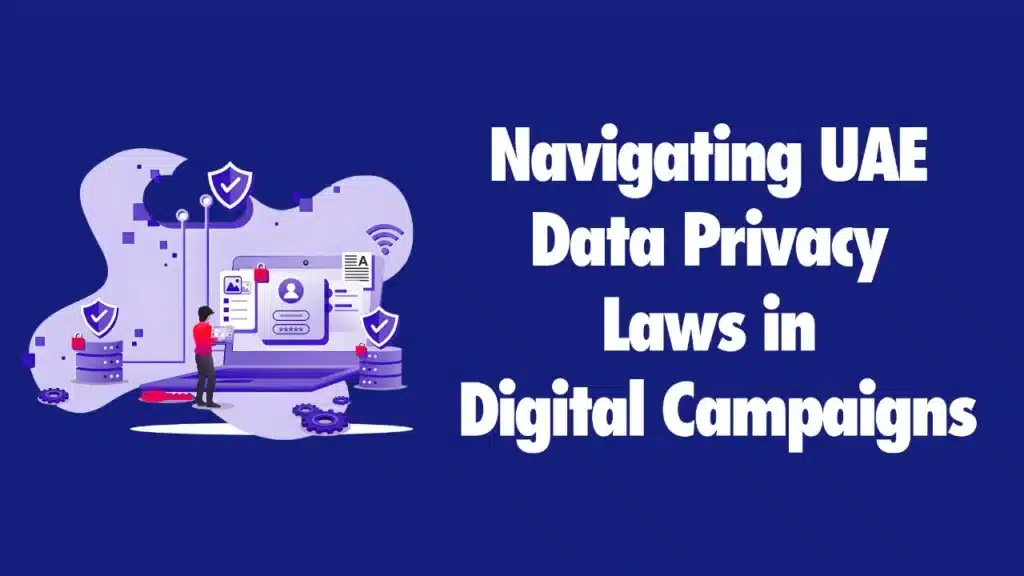Navigating UAE Data Privacy Laws in Digital Campaigns

In an increasingly digital world, data privacy is no longer just a concern for legal departments—it’s a marketing and customer experience priority. With the rise in digital campaigns across the UAE, businesses must now align with strict regulations to ensure they’re compliant and building customer trust from the very first click.
The UAE has introduced its own Personal Data Protection Law (PDPL) as part of its broader UAE Federal Decree-Law No. 45 of 2021, often referred to in marketing and legal circles as UAE PDPL compliance. For brands and agencies running digital campaigns, understanding how this compares to GDPR, managing cookie consent, navigating cross-border data flows, and implementing secure customer data practices is essential.
Let’s break down how marketers can stay compliant—and competitive—in this new regulatory landscape.
Understanding UAE PDPL Compliance: What Marketers Need to Know
The UAE Personal Data Protection Law (PDPL) came into effect in 2022 and establishes clear guidelines around how personal data is collected, stored, and used. While similar to Europe’s General Data Protection Regulation (GDPR), it has unique characteristics tailored to the UAE’s regulatory environment.
Key requirements for UAE PDPL compliance in digital marketing include:
- – Clear consent mechanisms before collecting or processing user data.
- – Specific purpose declarations—you must state exactly why you’re collecting data and how it will be used.
- – The right to withdraw consent at any time.
- – Data subject rights, including access, correction, and deletion of data.
- – Data Protection Officers (DPOs) may be required for certain types of data handling or companies.
For agencies and businesses running ads, email campaigns, or collecting data through forms or analytics tools, these guidelines must be baked into the digital ecosystem from the start.
Cookie Consent Management: More Than Just a Pop-Up
In digital marketing, cookies are everywhere—from tracking user sessions to retargeting ads. But under UAE PDPL (and similar to GDPR), cookie consent management has become critical.
You can no longer just notify users that cookies are being used. Instead, you need:
- – Explicit opt-in consent before setting any non-essential cookies (like analytics or marketing).
- – Granular choices—users should be able to accept or reject different types of cookies.
- – Real-time consent tracking that’s logged and stored in case of audits.
- – Easy opt-out options if users change their minds.
Tools like OneTrust, Cookiebot, or UAE-specific plugins can help implement cookie consent management across websites. For brands targeting UAE customers, this isn’t just about legality—it’s about building transparency and trust.
GDPR vs. UAE Regulations: What’s Different?
Many international marketers assume UAE PDPL is just a copy of GDPR, but there are notable differences that impact how campaigns are built:
| Aspect | GDPR (EU) | UAE PDPL |
| Data Transfer | Allowed under specific safeguards | Requires permit from UAE Data Office |
| DPO Requirement | Mandatory for large-scale processing | Conditional, based on activity nature |
| Fines | Up to €20 million or 4% of revenue | Penalties not yet clearly defined |
| Territorial Scope | Covers EU residents anywhere | Covers data processed within the UAE |
| Legal Basis for Processing | Consent, contract, legal obligation | Similar, with emphasis on consent |
While GDPR focuses on extraterritorial reach, UAE’s PDPL is geared more toward regulating data within its own jurisdiction, with particular attention to national security and cross-border transfers.
For companies that operate in both regions or handle international clientele, it’s essential to implement hybrid compliance strategies that address both regulations.
Cross-Border Data Flows: New Hurdles for Global Campaigns
Running an e-commerce or service-based digital campaign often involves cross-border data flows—think sending email lists to international servers or using a CRM hosted in another country.
Under UAE PDPL:
- – Data transfers outside the UAE require approval from the UAE Data Office unless going to “approved countries.”
- – Businesses must demonstrate that foreign servers offer comparable levels of protection.
- – Even analytics or marketing tools (e.g., Meta, Google, HubSpot) may need vetting if hosted abroad.
What can you do?
- – Use cloud providers with UAE or GCC-region data centers (e.g., AWS Middle East).
- – Clearly disclose cross-border transfers in your privacy policy.
- – Minimize unnecessary international data transfers—host data locally if possible.
Secure Customer Data Practices: It’s a Brand Trust Issue
Beyond regulation, how you protect customer data is now a differentiator. Users are more aware than ever about how their data is handled—and more likely to abandon brands that misuse or expose it.
To implement secure customer data practices, brands should:
- – Encrypt personal data during both transmission and storage.
- – Set up role-based access controls—only give data access to people who need it.
- – Use secure forms and verified SSL certificates for all data collection points.
- – Run penetration testing and audits regularly to check for vulnerabilities.
- – Be ready with a Data Breach Response Plan, including communication templates and DPO involvement.
Security should be part of the customer journey—from ad click to checkout confirmation.
In the UAE’s fast-paced digital economy, the brands that win will be the ones who combine innovative marketing with data responsibility. Compliance with UAE PDPL, careful handling of cookie consent, transparency around cross-border data flows, and secure customer data practices are not just checkboxes—they’re essential components of building long-term customer trust.
At Trout Digital, we help brands run powerful, privacy-compliant digital campaigns. From consent-driven web design to privacy-focused ad strategy and GDPR vs. UAE regulations navigation, we make compliance seamless and growth-focused.